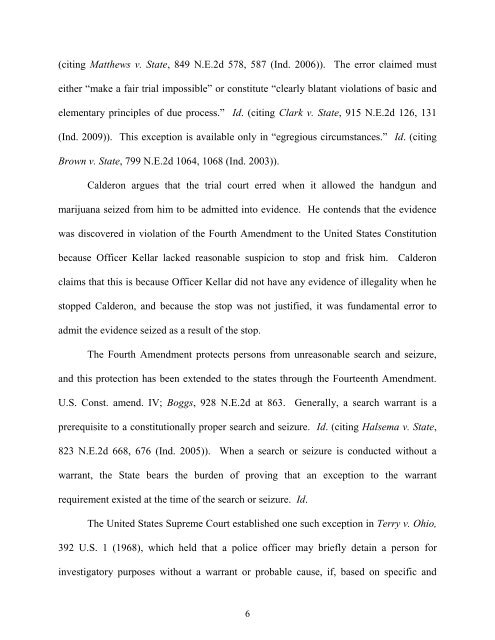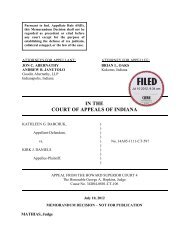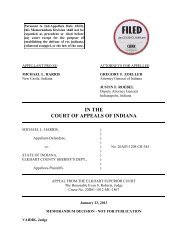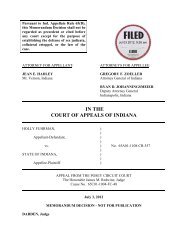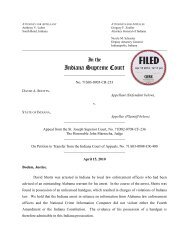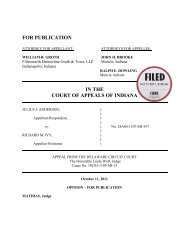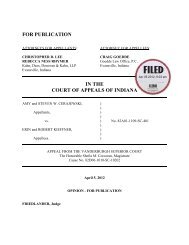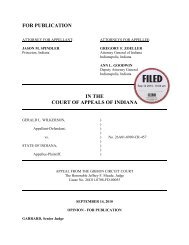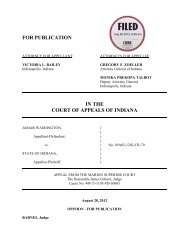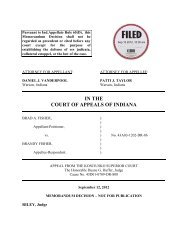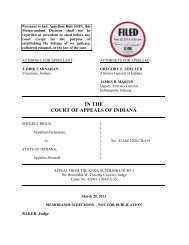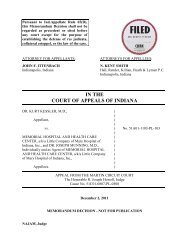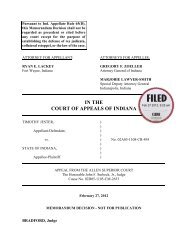Ivan Calderon v. State of Indiana
Ivan Calderon v. State of Indiana
Ivan Calderon v. State of Indiana
Create successful ePaper yourself
Turn your PDF publications into a flip-book with our unique Google optimized e-Paper software.
(citing Matthews v. <strong>State</strong>, 849 N.E.2d 578, 587 (Ind. 2006)). The error claimed must<br />
either “make a fair trial impossible” or constitute “clearly blatant violations <strong>of</strong> basic and<br />
elementary principles <strong>of</strong> due process.” Id. (citing Clark v. <strong>State</strong>, 915 N.E.2d 126, 131<br />
(Ind. 2009)). This exception is available only in “egregious circumstances.” Id. (citing<br />
Brown v. <strong>State</strong>, 799 N.E.2d 1064, 1068 (Ind. 2003)).<br />
<strong>Calderon</strong> argues that the trial court erred when it allowed the handgun and<br />
marijuana seized from him to be admitted into evidence. He contends that the evidence<br />
was discovered in violation <strong>of</strong> the Fourth Amendment to the United <strong>State</strong>s Constitution<br />
because Officer Kellar lacked reasonable suspicion to stop and frisk him. <strong>Calderon</strong><br />
claims that this is because Officer Kellar did not have any evidence <strong>of</strong> illegality when he<br />
stopped <strong>Calderon</strong>, and because the stop was not justified, it was fundamental error to<br />
admit the evidence seized as a result <strong>of</strong> the stop.<br />
The Fourth Amendment protects persons from unreasonable search and seizure,<br />
and this protection has been extended to the states through the Fourteenth Amendment.<br />
U.S. Const. amend. IV; Boggs, 928 N.E.2d at 863. Generally, a search warrant is a<br />
prerequisite to a constitutionally proper search and seizure. Id. (citing Halsema v. <strong>State</strong>,<br />
823 N.E.2d 668, 676 (Ind. 2005)). When a search or seizure is conducted without a<br />
warrant, the <strong>State</strong> bears the burden <strong>of</strong> proving that an exception to the warrant<br />
requirement existed at the time <strong>of</strong> the search or seizure. Id.<br />
The United <strong>State</strong>s Supreme Court established one such exception in Terry v. Ohio,<br />
392 U.S. 1 (1968), which held that a police <strong>of</strong>ficer may briefly detain a person for<br />
investigatory purposes without a warrant or probable cause, if, based on specific and<br />
6


